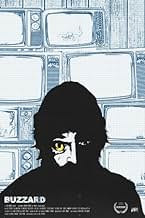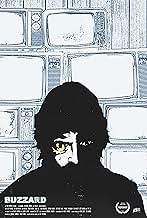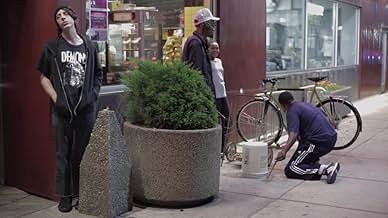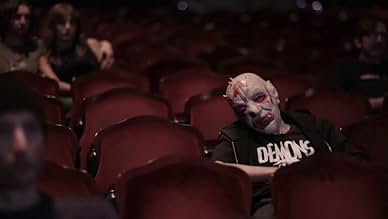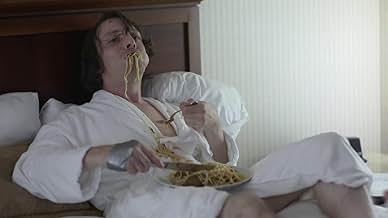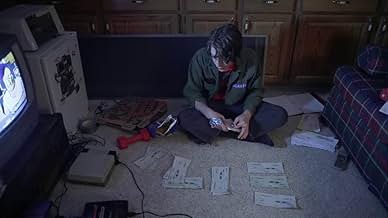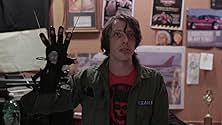IMDb RATING
6.3/10
2.4K
YOUR RATING
Paranoia forces small-time scam artist Marty to flee his hometown and hide out in a dangerous Detroit. With nothing but a pocket full of bogus checks, his Power Glove, and a bad temper, the ... Read allParanoia forces small-time scam artist Marty to flee his hometown and hide out in a dangerous Detroit. With nothing but a pocket full of bogus checks, his Power Glove, and a bad temper, the horror metal slacker lashes out.Paranoia forces small-time scam artist Marty to flee his hometown and hide out in a dangerous Detroit. With nothing but a pocket full of bogus checks, his Power Glove, and a bad temper, the horror metal slacker lashes out.
- Awards
- 5 wins & 7 nominations total
Crystal Sparks
- Maid
- (as Crystal Hilliard)
- Director
- Writer
- All cast & crew
- Production, box office & more at IMDbPro
Featured reviews
"I may live badly, but at least I don't have to *work* to do it." Hitchhiker from Richard Linklater's Slacker.
The slacker, Marty (Joshua Burg), in his titular reference, Buzzard, is more socially disaffected than Napoleon Dynamite and scarier in a covert sense than Freddie Krueger. In all, this comedy drama is a witty allegory about teen anomie and an indictment of a society that constructs barriers through bureaucratic indifference.
Marty is a small time scam artist, mostly stealing checks from his temp work at a bank to trading in discarded McDonald's sandwiches from the garbage for fresh ones. All the while this metal meat head has a poster of Freddie and a glove with knives for digits. You guessed it: If director Joel Potrykus places the glove in a shot early on, chances are we'll see it later on in a far less sedentary shot.
Yet meanwhile, Marty is pulling little cons with motel room access and check kiting and generally avoiding the law. He is alternately lovable in his counterculture way and menacing when faced with authority he doesn't respect. Through most of the film, Marty is an amusing though disreputable slacker, a temp worker ripping off the bank he works for and a buddy only temporarily engaged while he thinks of his next low-level crime.
"Buzzard" should get the year's prize for the most accurate title in film. Marty feeds off the carrion of society while he literally does so in his McDonald's larcenies. Until the climax, he evades the authorities, who must by now be up to his game. Without focusing on his criminal activities, an inference could be drawn that society needs to be vigilant and proactive to help these Napoleons have meaningful lives. Otherwise, Freddie has spawned a most lethal buzzard.
The slacker, Marty (Joshua Burg), in his titular reference, Buzzard, is more socially disaffected than Napoleon Dynamite and scarier in a covert sense than Freddie Krueger. In all, this comedy drama is a witty allegory about teen anomie and an indictment of a society that constructs barriers through bureaucratic indifference.
Marty is a small time scam artist, mostly stealing checks from his temp work at a bank to trading in discarded McDonald's sandwiches from the garbage for fresh ones. All the while this metal meat head has a poster of Freddie and a glove with knives for digits. You guessed it: If director Joel Potrykus places the glove in a shot early on, chances are we'll see it later on in a far less sedentary shot.
Yet meanwhile, Marty is pulling little cons with motel room access and check kiting and generally avoiding the law. He is alternately lovable in his counterculture way and menacing when faced with authority he doesn't respect. Through most of the film, Marty is an amusing though disreputable slacker, a temp worker ripping off the bank he works for and a buddy only temporarily engaged while he thinks of his next low-level crime.
"Buzzard" should get the year's prize for the most accurate title in film. Marty feeds off the carrion of society while he literally does so in his McDonald's larcenies. Until the climax, he evades the authorities, who must by now be up to his game. Without focusing on his criminal activities, an inference could be drawn that society needs to be vigilant and proactive to help these Napoleons have meaningful lives. Otherwise, Freddie has spawned a most lethal buzzard.
This is the sort of film that kind of immediately grabs you from its opening scene, for no apparent reason really. It's not visually stunning or doing anything outrageous, it just has a very clear tone and seems to know what it's doing. The ride throughout is interesting, even if it has some parts that don't entirely work. The directing is smooth and has an off-kilter vibe that many would be proud of. I think this sort of film has the capacity to establish a real fanbase, and I wouldn't be surprised if it did. Overall, the running time also needed to be a little shorter, for such a limited story, but I recommend this uneasy, weird film.
Independent cinema didn't always make for a comfy home for big stars to do something "dramatic" even if it's only Oscar fluff or if it's some kind of micro-budget genre piece of whatever. When independent cinema fires on all cylinders, not all the time but often this is the case, you see a filmmaker without much (or any) interference and showing a vision of the world, a point of view, that is unique to them. We may be able to tap into it, or it may be difficult, but the vitality is the key thing (hell, even Gummo is something I have to acknowledge as a one-of-a-kind thing). Buzzard is like that; if it were out in the 90's it probably would have received a decent release in theaters (maybe 100 or more, at best, hopefully) and then found a home on video. Today it might have one or two theaters and go straight to Netflix. Which, if you catch the right 'Netflix and chill' couple on the right moment may not be a bad thing. Maybe. Maybe not.
Buzzard is as weird and off-putting as any indie I've seen in recent memory and a lot of it comes down to how the filmmaker Joel Portykus shows us this misfit Marty Jackitansky (sound a little like Rockitansky, the real name of Mad Max, just a thought, whatever). He's perhaps more than misfit: take a little of Travis Bickle, a little of Beavis & Butt-head (mostly the metal and horror movie obsessions but also the disaffection) and a lot of modern day slackerdom and you get Marty as a guy who lives on his own, has posters for Elm Street movies all over the place (even in his kitchen, nice production design touches!) and fashions his own Freddy Kruger knife-glove out of a Nintendo Power-Glove (which itself is a reference to Elm Street 6 - gotta love this director's indirect homage, but I digress).
He works at a temp job but barely and tries to do any little scams he can - that is as someone who is fairly unambitious in his thievery (i.e. ordering office products on the company dime that he can sell back at another store with a guy who's cool) - and then gets into some possible hot water over some checks. Again, not for any large amount, but it's the principle of the thing: the guy just hates, well, most things it seems, and spend a chunk of this narrative on a (halfway) work buddy's couch (the director Potrykus is this maladroit nerd).
It's a downward spiral kind of movie, and it's not an easy one to sit through. Matter of fact I think most people would find more to sympathize with in Bickle (at least he was a veteran in a sleazy city right?) and Marty is all about... well, who needs ambitions when you got the Freddy Kruger Power Glove and a Nintendo game system to play after all? And as the story goes on and he gets into further (albeit petty) criminal acts, it gets harder to feel empathy with him - one of the 'set pieces' involves an almost experimental-film level moment where he sits in a bathrobe in a nice Detroit hotel eating a plate of spaghetti leaning back in bed - but perhaps that's the idea.
Sometimes art is about challenging our notions how people live and what we might do in their situation. Marty doesn't have much in the way of morals, he does what he does so he can get by. Don't many Americans living in the paycheck-to-paycheck scenarios? I think that what the film may lack in outright comedy - sometimes I found myself laughing, usually over the childish griping between Marty and Derek in the latter's basement, mostly in the movie I was silent - it has oodles of in fascinating behavior. You feel uneasy about this, and it lacks an original score outside of the very occasional diegetic music. I found myself hooked into this man's journey towards destruction and all of his own self-imposed beats to keep himself into a pattern (this includes a couple of awkward phone calls to his mother, it's in these moments I felt the depth in Burge's mostly interior except when angry performance).
The very ending (like the last shot) is a little too perplexing for its own good (except to say, I guess, that doom will never leave him or something, it's too vague to make its point substantive), and not all of the non-professional acting is solid. Otherwise, Buzzard is an excellent, oddly ambitious and discomfittingly weird example of how to tell a story of very human self-destruction all with a guy who does every little trick he can to get by... until he can't. But hey, that's why he's got that glove!
Buzzard is as weird and off-putting as any indie I've seen in recent memory and a lot of it comes down to how the filmmaker Joel Portykus shows us this misfit Marty Jackitansky (sound a little like Rockitansky, the real name of Mad Max, just a thought, whatever). He's perhaps more than misfit: take a little of Travis Bickle, a little of Beavis & Butt-head (mostly the metal and horror movie obsessions but also the disaffection) and a lot of modern day slackerdom and you get Marty as a guy who lives on his own, has posters for Elm Street movies all over the place (even in his kitchen, nice production design touches!) and fashions his own Freddy Kruger knife-glove out of a Nintendo Power-Glove (which itself is a reference to Elm Street 6 - gotta love this director's indirect homage, but I digress).
He works at a temp job but barely and tries to do any little scams he can - that is as someone who is fairly unambitious in his thievery (i.e. ordering office products on the company dime that he can sell back at another store with a guy who's cool) - and then gets into some possible hot water over some checks. Again, not for any large amount, but it's the principle of the thing: the guy just hates, well, most things it seems, and spend a chunk of this narrative on a (halfway) work buddy's couch (the director Potrykus is this maladroit nerd).
It's a downward spiral kind of movie, and it's not an easy one to sit through. Matter of fact I think most people would find more to sympathize with in Bickle (at least he was a veteran in a sleazy city right?) and Marty is all about... well, who needs ambitions when you got the Freddy Kruger Power Glove and a Nintendo game system to play after all? And as the story goes on and he gets into further (albeit petty) criminal acts, it gets harder to feel empathy with him - one of the 'set pieces' involves an almost experimental-film level moment where he sits in a bathrobe in a nice Detroit hotel eating a plate of spaghetti leaning back in bed - but perhaps that's the idea.
Sometimes art is about challenging our notions how people live and what we might do in their situation. Marty doesn't have much in the way of morals, he does what he does so he can get by. Don't many Americans living in the paycheck-to-paycheck scenarios? I think that what the film may lack in outright comedy - sometimes I found myself laughing, usually over the childish griping between Marty and Derek in the latter's basement, mostly in the movie I was silent - it has oodles of in fascinating behavior. You feel uneasy about this, and it lacks an original score outside of the very occasional diegetic music. I found myself hooked into this man's journey towards destruction and all of his own self-imposed beats to keep himself into a pattern (this includes a couple of awkward phone calls to his mother, it's in these moments I felt the depth in Burge's mostly interior except when angry performance).
The very ending (like the last shot) is a little too perplexing for its own good (except to say, I guess, that doom will never leave him or something, it's too vague to make its point substantive), and not all of the non-professional acting is solid. Otherwise, Buzzard is an excellent, oddly ambitious and discomfittingly weird example of how to tell a story of very human self-destruction all with a guy who does every little trick he can to get by... until he can't. But hey, that's why he's got that glove!
BUZZARD follows Marty, a small-time criminal who tries to carry out various scams whenever he gets a chance. Shortly after he extends his activities to cashing other people's checks from the bank for which he works, he realizes that he is about to be caught. So he first goes into hiding in his nerdy work friend's basement, and then, as his paranoia about getting caught increases, travels to Detroit.
This movie was well-received by critics. The top critic comment, giving this a perfect score, called it a "scathing indictment of capitalism". Except, it isn't.
There certainly is social commentary here on how the capitalist system can turn people into drones dependent on the next meager paycheck, reduced to trading frivolous escapist entertainment for a higher sense of purpose, and even discharged of their empathy for less fortunate fellow human beings.
And I can see why a movie critic would think that Marty's story is an indictment of capitalism: although he is a crook, he has at times a child-like naivete which is hard to believe, and which sets him up for many of this troubles. If we squint really hard, we could argue that the capitalist system exploits this naivete to take advantage of him.
But the problem is that, as the character is drawn, his compromised ethics is not the result of being exploited by the capitalist system, but simply of him being a person with low ethical standards.
Sure, there are scenes where he speaks to his mother and lies not for personal advantage but to make sure she does not worry about him, and on one call he even makes a point to request that she tell his siblings that he loves them. These scenes certainly humanize him, and nobody questions that he is capable of love, but it does not change that, as drawn in this movie, his character would still be a criminal in a more just society, one that did not try to take advantage of him at every turn. And that is what undermines the movie as an indictment of capitalism.
It is instructive to compare BUZZARD to EMILY THE CRIMINAL (2022), a thematically very similar movie which is both better entertainment and a real "scathing indictment of capitalism": Emily's ethical standards are also lower than those of most people, but she hangs on to a fundamental sense of fairness that Marty simply lacks.
Only when this sense of fairness is violated by the Kafkaesque obstacles erected in her way by the capitalist system does she resort to crime. It really makes a huge difference in how we contextualize her situation compared to his. And I think that is exactly how it should be, because there has to be a point at which blaming the system becomes merely an abdication of personal responsibility.
The various ways by which Marty carries out his many small scams are amusing, as are various sequences of silly games he and his friend invent and play. His portrayal as a small-time crook seems naturalistic to me and may be interesting as character study. But Marty's lack of a fundamental sense of fairness made it hard for me to relate to him, and it negatively affected my enjoyment of the movie.
There is a tonal shift toward the dark when the movie goes into the third act and Marty goes to Detroit, but it didn't feel that pronounced to me because the purportedly more lighthearted earlier acts already felt uncomfortable.
The movie ends on a note of irony and takes a small surrealist turn, but I could not do much with that. This is not the kind of comedy I would normally watch for entertainment.
This movie was well-received by critics. The top critic comment, giving this a perfect score, called it a "scathing indictment of capitalism". Except, it isn't.
There certainly is social commentary here on how the capitalist system can turn people into drones dependent on the next meager paycheck, reduced to trading frivolous escapist entertainment for a higher sense of purpose, and even discharged of their empathy for less fortunate fellow human beings.
And I can see why a movie critic would think that Marty's story is an indictment of capitalism: although he is a crook, he has at times a child-like naivete which is hard to believe, and which sets him up for many of this troubles. If we squint really hard, we could argue that the capitalist system exploits this naivete to take advantage of him.
But the problem is that, as the character is drawn, his compromised ethics is not the result of being exploited by the capitalist system, but simply of him being a person with low ethical standards.
Sure, there are scenes where he speaks to his mother and lies not for personal advantage but to make sure she does not worry about him, and on one call he even makes a point to request that she tell his siblings that he loves them. These scenes certainly humanize him, and nobody questions that he is capable of love, but it does not change that, as drawn in this movie, his character would still be a criminal in a more just society, one that did not try to take advantage of him at every turn. And that is what undermines the movie as an indictment of capitalism.
It is instructive to compare BUZZARD to EMILY THE CRIMINAL (2022), a thematically very similar movie which is both better entertainment and a real "scathing indictment of capitalism": Emily's ethical standards are also lower than those of most people, but she hangs on to a fundamental sense of fairness that Marty simply lacks.
Only when this sense of fairness is violated by the Kafkaesque obstacles erected in her way by the capitalist system does she resort to crime. It really makes a huge difference in how we contextualize her situation compared to his. And I think that is exactly how it should be, because there has to be a point at which blaming the system becomes merely an abdication of personal responsibility.
The various ways by which Marty carries out his many small scams are amusing, as are various sequences of silly games he and his friend invent and play. His portrayal as a small-time crook seems naturalistic to me and may be interesting as character study. But Marty's lack of a fundamental sense of fairness made it hard for me to relate to him, and it negatively affected my enjoyment of the movie.
There is a tonal shift toward the dark when the movie goes into the third act and Marty goes to Detroit, but it didn't feel that pronounced to me because the purportedly more lighthearted earlier acts already felt uncomfortable.
The movie ends on a note of irony and takes a small surrealist turn, but I could not do much with that. This is not the kind of comedy I would normally watch for entertainment.
There is nothing about this movie I would change given the chance, and that's why I give it 10/10. I'm not sure when this movie is supposed to take place & love that it didn't matter. Marty is the gutsiest slacker on earth, taking advantage of the system everywhere he goes. The camera spends a lot of time in view of his face, which makes it all that much more apparent how withdrawn and composed he is in his scams, and effective when we notice him displaying fear & rage & doubt as things begin to close in on him. One of my favorite parts of this movie was Marty's selfish, awkward & mismatched relationship with his coworker and friend(?). Napoleon Dynamite-ish humor there. A scene where they snack of Bugles brought me to tears. Yay for junk food & horror culture. Yay for this movie. Release it to DVD already so I can show all my friends.
Did you know
- TriviaThe spaghetti scene was filmed in one take. The script did not call for a long shot, but director Joel Potrykus simply stood by, watching in awe, as actor Joshua Burge shoved more and more into his mouth.
- ConnectionsFeatures The Beaver Trilogy (2000)
- SoundtracksCarmen de Proelio
Written & performed by Bog Rot
Courtesy of EHR, Inc.
- How long is Buzzard?Powered by Alexa
Details
Box office
- Gross US & Canada
- $14,591
- Opening weekend US & Canada
- $8,031
- Mar 8, 2015
- Gross worldwide
- $14,591
- Runtime
- 1h 37m(97 min)
- Color
- Aspect ratio
- 1.78 : 1
Contribute to this page
Suggest an edit or add missing content





